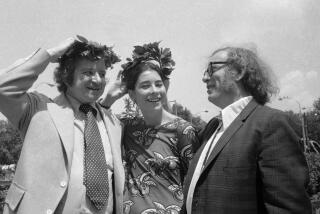Presidents’ Biographer Merle Miller Dies
Merle Miller, a best-selling biographer of Presidents who also was among the first of American homosexual artists to publicly tell of the travails connected with their sexual preferences, died Tuesday in a New England hospital.
He was 67 and died at Danbury, Conn., after surgery for a massive abdominal infection with complications of peritonitis.
The author of “Plain Speaking,” based on two years of interviews with Harry S. Truman and “Lyndon: An Oral Biography” of Lyndon B. Johnson, lived in nearby Brewster, N.Y.
Carol Hanley, his longtime associate, said he was stricken last week, survived surgery but died of the infection.
Was Editor of Yank
Miller was a former Washington correspondent for the Philadelphia Record who became an editor of Yank, the Army magazine, during World War II. After the war, he became a contributing editor to Time magazine and an editor at Harpers at a time in the late 1940s when he had begun writing the first of more than a dozen successful books.
Among them was “We Dropped the A-Bomb” followed by “That Winter,” “The Sure Thing,” “The Judges and Judged,” “A Secret Understanding” and the screenplay for “Kings Go Forth,” a 1958 Frank Sinatra film.
He took his experiences as a television scriptwriter and made them into a book: “Only You, Dick Daring!” and followed that with the nonfictional “Marshalltown, Iowa,” about his hometown in which he grew up to parents who told him years later they had “ordered a little girl and when you came along, we were somewhat disappointed.”
In 1971, after “almost 50 years to come out of the closet . . . “ he published “On Being Different: What It Means to Be a Homosexual.”
On Being ‘Different’
In an article in the New York Times Magazine, he elaborated on his experiences as a “different” child in a small Midwest town, dwelling at length on his infancy when he was swathed in pink baby blankets, purchased “before the disaster, my birth.”
When he was interviewing Truman in 1961-62 for “Plain Speaking,” he recalled the empathy he felt when the former President described his own inadequacies because, as Truman said, “the popular boys were the athletes with their big, tight fists, and I was never like that.”
Both the President and the author wore thick glasses and learned painfully that “four eyes” was not a term of endearment.
Miller was widely praised for capturing the essential Truman between hard covers, quoting him liberally about Gen. Douglas A. MacArthur (“not right in his head”); Richard M. Nixon (“a shifty-eyed goddamn liar”) and Sen. Joseph R. McCarthy (“nothing but a damned coward”) among others.
Seven years after the Truman work, which was based on dozens of individual interviews with the former President, Miller brought forth his Johnson book, in which he talked to 180 individuals and listened to 400 oral histories.
Respected Johnson
Miller said he learned to respect Johnson, who died seven years before the biography was published, for his parliamentary skills. Those who spoke of Johnson for Miller’s book were not always that complimentary, however.
The Johnson book was the basis for a play with Jack Klugman as the President, while the Truman work became a popular one-man show and film “Give ‘Em Hell Harry,” starring James Whitmore.
Miller’s last book, said his associate, Hanley, is a biography of Dwight D. Eisenhower, as man and President, the result of months of interviews with those who knew him best throughout his life. It is to be published soon, she said.
In elaborating in the New York Times article on why he had chosen to “stop pretending to be something I was not,” Miller reflected on the then-activist stirrings of the homosexual community in the United States and his own feelings that “Gay is good. . . . Gay is proud.”
‘If Given a Choice’
He allowed that, “If I had been given a choice I would prefer to have been straight. But then would I rather not have been me?”
Writing from his studio in Brewster, he concluded poignantly that, “it is December and the sun is shining on the pine trees. . . . the air is extraordinarily clear and the sky is the color it gets only at this time of year. . . . On such a day I would not choose to be anyone else or any place else.”
Miller is survived by his friend of 22 years, David W. Elliott.
More to Read
Sign up for our Book Club newsletter
Get the latest news, events and more from the Los Angeles Times Book Club, and help us get L.A. reading and talking.
You may occasionally receive promotional content from the Los Angeles Times.








